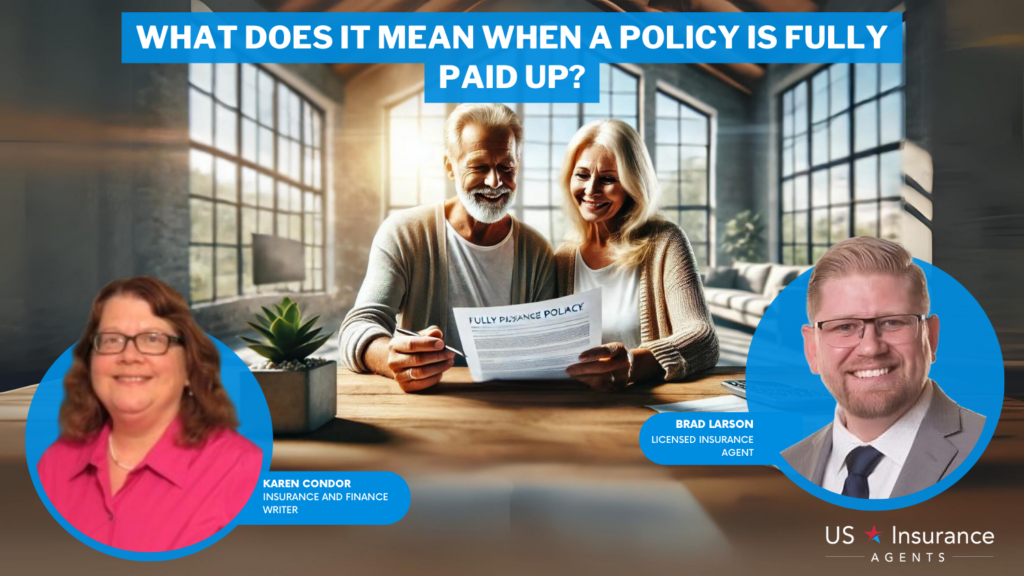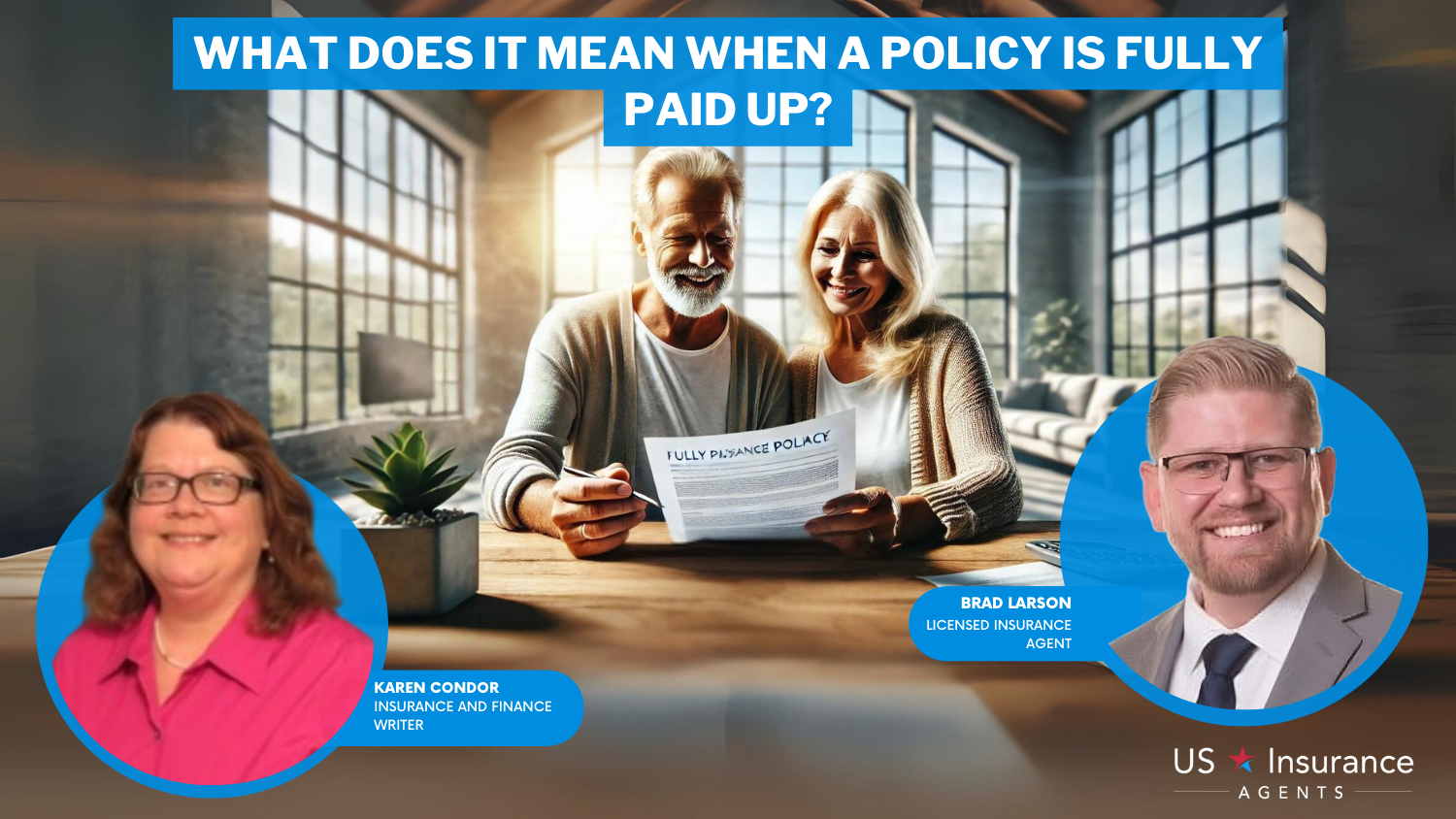What does it mean when a policy is fully paid up?
Unravel the concept of a 'fully paid up' policy and its implications with the expert guidance of Company X. In the realm of insurance, understanding this crucial term is essential for making informed decisions about your coverage. A 'fully paid up' policy signifies that all required premium payments have been made, granting you peace of mind knowing that your policy remains in force without the need for any further financial contributions.
Read more Secured with SHA-256 Encryption





Table of Contents
Table of Contents


Insurance and Finance Writer
Karen Condor is an insurance and finance writer who has degrees in both journalism and communications. She began her career as a reporter covering local and state affairs. Her extensive experience includes management positions in newspapers, magazines, newsletters, and online marketing content. She has utilized her researching, writing, and communications talents in the areas of human resources...
Karen Condor


Sr. Director of Content
Sara Routhier, Senior Director of Content, has professional experience as an educator, SEO specialist, and content marketer. She has over 10 years of experience in the insurance industry. As a researcher, data nerd, writer, and editor, she strives to curate educational, enlightening articles that provide you with the must-know facts and best-kept secrets within the overwhelming world of insurance....
Sara Routhier


Licensed Insurance Agent
Brad Larson has been in the insurance industry for over 16 years. He specializes in helping clients navigate the claims process, with a particular emphasis on coverage analysis. He received his bachelor’s degree from the University of Utah in Political Science. He also holds an Associate in Claims (AIC) and Associate in General Insurance (AINS) designations, as well as a Utah Property and Casual...
Brad Larson
Updated January 2025
Unravel the concept of a ‘fully paid up’ policy and its implications with the expert guidance of Company X. In the realm of insurance, understanding this crucial term is essential for making informed decisions about your coverage. A ‘fully paid up’ policy signifies that all required premium payments have been made.

- A fully paid-up insurance policy doesn’t require additional payments
- A discount is available when you pay an insurance policy in full
- Paid-up addition is a term used in life insurance policies
Discover the significance of this term and ensure you have a clear understanding of your policy’s financial obligations. Trust in the expertise of Company X to shed light on this important insurance concept and secure a brighter future for you and your loved ones.
What does it mean when a policy is ‘fully paid up?’
A fully paid-up policy results when you pay the car insurance bill in full. In other words, if your annual auto insurance bill is $1,500 and you pay the total amount, you won’t have any more payments.
All drivers have an opportunity to pay a policy in full when the car insurance company requests a deposit. If you decide to pay in full, you’ll receive a discount. Opting to pay your annual premium upfront can unlock a pay in full car insurance discount, which is a fantastic way to reduce your overall insurance costs while keeping your vehicle covered.
Free Auto Insurance Comparison
Compare Quotes From Top Companies and Save
Secured with SHA-256 Encryption
Do I have to pay my car insurance policy in full?
No, you don’t. But you usually have to make a deposit. Fully paid-up car insurance rates are approximately 10% less expensive.
When you make a deposit, you’ll miss the pay-in-full discount. However, deposits reduce your monthly rates.
Let’s examine how making a deposit to the average auto insurance rate affects monthly and annual rates.
- Rates with no down payment – $268/month or $3,216/year
- 10% down payment – $241/month or $2,894/year
- 20% down payment – $214/month or $2,572/year
- 30% down payment – $188/month or $2,251/year
- 40% down payment – $160/month or $1,930/year
The more you deposit on your car insurance bill, the less you’ll pay for the policy’s term.
How do I get affordable fully paid-up car insurance quotes?
You can purchase fully paid-up car insurance after you undergo an insurance company’s quote process.
Several factors determine whether affordable paid-up auto insurance is available to you. The best factors for affordable fully paid-up car insurance rates include a good driving record, excellent credit, a medium coverage level, low annual mileage, and a high deductible.
What happens to car insurance after you pay off a loan?
Nothing actually happens to your auto insurance after paying off your car loan. But you have an option to either keep full coverage insurance or downgrade to liability-only insurance.
However, we strongly recommend that you keep full coverage car insurance. Repairs for new vehicles cost less than what the car is worth. And vehicles worth less than total loss accident repairs don’t need full coverage, but full coverage insurance can help replace a car that isn’t worth much.
Therefore, you should keep extra auto insurance coverage even if it’s not required.
Fully Paid-Up Policy Explained: What it Means and how it Works
A fully paid policy for car insurance signifies that you have settled all the required premium payments, meaning no further payments are necessary to maintain your coverage. For example, when your policy is paid in full with Progressive, it indicates you have no outstanding premiums for that term.
The Progressive policy paid in full meaning ensures uninterrupted coverage without monthly obligations. Similarly, AIG Insurance and AAA insurance payment options offer benefits for full payments.
Free Auto Insurance Comparison
Compare Quotes From Top Companies and Save
Secured with SHA-256 Encryption
Understanding a Full Payment Policy and its Benefits
What does a full payment policy mean? It means that the policyholder has met all financial requirements, eliminating the need for additional payments.
In regions like California, auto insurance is paid in full to comply with state regulations, offering peace of mind and potential discounts. California auto insurance is paid in full, explained the car insurance deposit, and addresses the question: do you pay car insurance monthly?
The Advantages of Paying Car Insurance in Full
Can you pay car insurance in full? Yes, and doing so can often result in cost savings. Explained, the car insurance deposit is an initial payment that can reduce subsequent premiums. Car insurance paid in full is a convenient option, especially when looking for cheap homeowners insurance in Arkansas, where full payments can offer discounts.
Do you have to pay upfront for car insurance? Not always, but paying upfront can reduce the hassle of monthly payments. Speaking of payments, do you pay auto insurance monthly? Yes, many opt for this, but full payment might offer discounts. Does Geico car insurance decrease when the car is paid off? It can, as owning a car outright often reduces premium rates.
Understanding Fully Paid-Up Policies and Payment Options
In LIC, a fully paid-up life insurance policy means that all premiums are paid, securing the policy’s benefits without further payments. The meaning of a fully paid-up policy and fully paid-up meaning both point to a completed financial obligation, freeing the policyholder from future payments. Utilize a fully paid discount code if available to save even more. Fully paid meaning simplifies the concept: no more premiums due.
How is car insurance paid? Options include monthly, annually, or upfront payments. Insurance policies when payment is due should be managed carefully to avoid lapses in coverage.
Free Auto Insurance Comparison
Compare Quotes From Top Companies and Save
Secured with SHA-256 Encryption
Understanding Fully Paid-Up Insurance Policies
In the realm of insurance, a fully paid-up status of insurance policy means that all required premiums have been paid in advance, ensuring continuous coverage without further financial obligations. This status is achieved by paying insurance in full upfront rather than opting for paying car insurance in full vs monthly installments.
For instance, an example of a paid-up policy could be seen with certain insurers like Progressive, where policies may only pay in full to enjoy benefits such as reduced paid-up insurance costs and clarity on policy balance meaning. This approach not only secures comprehensive protection but also potentially unlocks discounts and simplifies financial planning.
The Meaning of Fully Paid-Up
A “fully paid-up” policy refers to an insurance policy on which all required premiums have been paid. Once a policy is fully paid-up, it remains in force for the duration of the policy term without the need for any further payments. This status can provide policyholders with peace of mind, knowing that their coverage is secure without additional financial obligations.
How does ‘paid up’ relate to life insurance?
Paid-up insurance, in regard to life insurance, is a policy that’s paid in full. In other words, you won’t have any monthly fees after paying your annual rate for the year.
However, paid-up insurance options are merely for specific life insurance policies, such as whole life insurance. A whole life insurance policy provides coverage for your entire life.
If you want to pay for your whole life insurance a year in advance, you have an option to do that.
What are paid-up additions?
Paid-up addition (or PUA) is a life insurance rider that provides you with an option to convert your cash value into another life insurance policy.
The paid-up additional insurance won’t have any monthly payments but generates a lower death benefit. Also, you won’t have to take another medical exam.
Some life insurance companies use annual dividends to buy smaller policies. And each insurance policy has a cash value with the potential to grow.
Paid-up addition insurance is usually sold at mutual insurance companies that sell permanent life insurance.
Case Studies: Understanding Fully Paid-Up Policies
Case Study 1: John’s Life Insurance Policy
John purchased a life insurance policy when he was 30 years old. The policy had a term of 30 years and required him to make monthly premium payments. Over the course of three decades, John diligently made his premium payments without any lapses.
At the age of 60, he received a notice from the insurance company stating that his policy was now fully paid up. This meant that he no longer needed to make any more payments to maintain the coverage until the policy’s maturity.
Case Study 2: Sarah’s Auto Insurance Policy
Sarah had been insuring her car through an auto insurance policy for several years. She always paid her premiums on time and maintained a good driving record. After 10 years of continuous coverage, Sarah’s insurance company informed her that her policy was fully paid up.
This meant that she had fulfilled all her financial obligations toward the policy, and her coverage would remain active without any further premium payments.
Case Study 3: Lisa’s Homeowner’s Insurance Policy
Lisa had been paying premiums for her homeowner’s insurance policy for 20 years. Due to her consistent payments, she managed to fully pay up her policy. Now, Lisa had the peace of mind knowing that her home was protected without any additional financial obligations towards the insurance company.
Case Study 4: Mark’s Health Insurance Policy
Mark had a health insurance policy that required monthly premium payments. Over the years, he always ensured that his premiums were paid on time. After reaching the policy’s specified payment duration, Mark received a notice from the insurance provider stating that his policy was fully paid up.
This meant that Mark would continue to have health insurance coverage without having to make any further premium payments.
Free Auto Insurance Comparison
Compare Quotes From Top Companies and Save
Secured with SHA-256 Encryption
Understanding Paid-Up Policies in Insurance
A paid-up policy in insurance refers to a policyholder completing all required premium payments, ensuring the policy is fully paid and remains in force without further financial obligations.
This status applies across various insurance types, including car and life insurance. Fully paid insurance, Paid-up insurance policies, and Paid-up policies represent this achieved status, providing peace of mind with continuous coverage and potential benefits like cash value accumulation in certain types of policies.
Key Concepts and Benefits
- Upfront Payment for Insurance: Opting for an upfront payment for insurance premiums often leads to a paid-in-full discount, reducing overall costs.
- Is car insurance paid in advance?: Yes, paying car insurance in full upfront eliminates the need for monthly payments, offering convenience and potential savings.
- Meaning of LIC Policy with a Fully Paid-Up Status: For LIC policies, achieving a fully paid-up status means all premiums have been settled, securing lifelong coverage without additional payments.
- Car Paid in Full: Refers to the status where all financial obligations related to car insurance premiums have been fulfilled, ensuring continuous coverage.
- Paid-in-Full Discount: Insurance companies may offer discounts for policies paid in full, providing financial benefits to policyholders.
- Additional Paid-Up Insurance: This refers to options in policies, such as life insurance, where additional premiums can be paid to increase cash value or coverage.
- Paid-Up Insurance Definition and Policies: Describes insurance policies where premiums have been completely paid, ensuring coverage until maturity or policy termination.
- Paid-Up Life Insurance: Specifically applies to life insurance policies where all premiums have been paid, guaranteeing coverage and potential cash value access.
- Paid-Up Insurance Policy: Signifies the completion of premium payments, ensuring continued insurance coverage without further financial obligations.
- Paid-Up Life Insurance Policy: Refers to life insurance policies that are fully paid, providing lifelong coverage and potential cash value benefits.
- Paid-Up Status in Insurance: Indicates that all required premiums have been paid, securing the insurance policy without additional financial contributions.
Understanding these terms is crucial for policyholders to make informed decisions about their insurance coverage and financial planning.
Fully Paid-Up Insurance: The Bottom Line
Paid-up insurance has various definitions depending on the insurance type. Paid-up policy meaning signifies that no further payments are required once all premiums have been paid. This status provides peace of mind as paid-up insurance meaning indicates continuous coverage without ongoing financial obligations.
For example, Progressive insurance only pays in full, emphasizing the benefit of settling all premiums upfront. This approach not only ensures uninterrupted protection but may also qualify policyholders for discounts, depending on the insurer and policy specifics.
The advantage of paid-up insurance is that you won’t have any additional payments, and you can receive a discount in some cases. But your savings are determined by specific factors and the company that has your policy.
Before you decide to purchase fully paid-up car insurance or life insurance, use our free online quote tool below to compare multiple insurance companies near you.

Frequently Asked Questions
What does paid-up additional insurance mean?
Paid-up additional insurance refers to additional coverage purchased using dividends from a whole life insurance policy. This additional insurance does not require further premium payments and increases the overall death benefit of the policy.
What does paid-up insurance mean?
Paid-up insurance means that all required premiums for an insurance policy have been paid in full. The policy remains active without any further premium payments needed to maintain coverage.
What does paying in full mean for car insurance?
Paying in full for car insurance means making a single upfront payment to cover the entire premium for a specified period, typically a year. This method often qualifies the policyholder for discounts and ensures continuous coverage without monthly payments.
What is a paid-up insurance policy?
A paid-up insurance policy is one in which all premiums have been paid in full, ensuring the policy remains in force without the need for further payments. This term is commonly associated with cash value life insurance policies.
What is additional paid-up insurance?
Additional paid-up insurance refers to purchasing more coverage using accumulated dividends from a whole life insurance policy. Like paid-up additional insurance, it does not require additional premium payments.
What is reduced paid-up insurance?
Reduced paid-up insurance allows the policyholder of a whole life insurance policy to stop paying premiums and instead receive a reduced amount of coverage. This option utilizes the policy’s cash value to maintain some insurance benefits.
What does it mean when your car insurance policy is paid in full?
When your car insurance policy is paid in full, it means you have made a lump-sum payment to cover the entire premium for a specified period (usually a year). This ensures continuous coverage without monthly or periodic payments.
What happens when your car insurance is paid in full?
When your car insurance is paid in full, you are typically eligible for a discount offered by insurance companies for upfront payments. Your coverage remains active for the term specified, and you avoid the hassle of monthly payments.
What happens after I pay off my car insurance?
After paying off your car insurance, your coverage remains intact until the end of the policy term. You do not need to make any further payments for that term, but you may need to renew or update your policy as needed when the term ends or your circumstances change.
What does it mean when a policy is ‘fully paid up?
When a policy is ‘fully paid up,’ it means that the policyholder has paid all of the required premiums and the policy is considered paid in full. The policy will remain in force and provide coverage for the specified period of time or until the policyholder decides to cancel it.
Is ‘fully paid up’ the same as ‘paid in full?
Are all insurance policies eligible to become ‘fully paid up?
Can a policy become fully paid up before the end of its term?
What are the benefits of having a fully paid up policy?
What is fully paid up?
Can I pay a home insurance policy in full?
Does term life insurance have paid-up riders?
Get a FREE Quote in Minutes
Insurance rates change constantly — we help you stay ahead by making it easy to compare top options and save.


